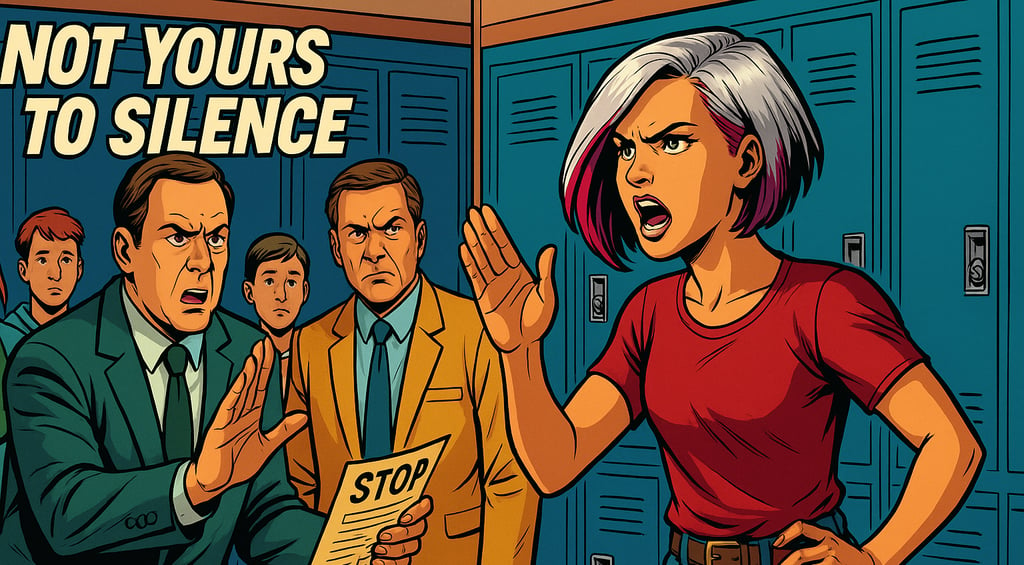Toxic Masculinity Is a System—Here’s How to Burn It Down with Your Words
Disrupt toxic masculinity with bold, assertive communication. Learn how to reclaim your voice and set boundaries without apology.
CULTURE DISRUPTPOP CULTUREASSERTIVE COMMUNICATIONREAL TALKWOMEN'S EMPOWERMENTSOCIAL COMMENTARY
Penny L. Sampson
4/6/20252 min read
Let’s get one thing straight:
Toxic masculinity isn’t just about locker room talk, angry bros in comment sections, or CEOs who think empathy is weakness. It’s a system—a cultural operating mode designed to keep power in the hands of the loudest, the most aggressive, the least accountable.
And it’s everywhere. At work. In schools. On dating apps. In pop culture. Even in that meeting where you smiled while being interrupted for the fifth damn time.
Recently, headlines flared up when Blake Lively called out paparazzi for stalking her kids—and then clapped back at the reporter who questioned her tone.
“You edit together images of my children, then ask me to be nice?”
She wasn’t playing nice. She was protecting her kids. And that is the energy.
Source: NBC Today Show
Then there was Keke Palmer, who made headlines not for her career moves but because her ex-boyfriend publicly shamed her for wearing a sheer dress to a concert. The implication? Women in the public eye should dress—and behave—to make men comfortable.
Source: Teen Vogue
These aren’t isolated moments. They’re reminders of what happens when women and femmes use their voice, take up space, or stop playing “nice.” They get shut down. Shamed. Policed.
But you don’t have to yell to burn it down.
You just have to stop letting the system speak for you.
So How Do You Burn It Down?
1. Name the pattern.
When someone talks over you, minimizes your input, or tries to dominate the conversation, don’t shrink. Try:
“Let me finish my thought.”
“I notice I’m being interrupted—again.”
“Let’s not conflate disagreement with disrespect.”
2. Hold the line.
Toxic systems rely on your discomfort to shut you up. Practice saying “No.” Full stop. No justification required.
3. Speak for others.
If someone else is being shut down, amplify:
“I don’t think she was finished.”
“Let’s hear their idea fully before we move on.”
4. Ditch the passive preamble.
Cut the “Sorry, just—” and “I was wondering if maybe—”
Say what you mean. Own your space.
5. Stop explaining your humanity.
You don’t need to justify your boundaries, your emotions, or your ambition. You're allowed to take up space and still be taken seriously.
What Happens When You Do?
You disrupt the system.
You model new norms for everyone watching—especially those who’ve been told they’re “too much,” “too loud,” or “too sensitive.”
You communicate from power instead of shame.
And you remind the world that you don’t have to act like a man to be heard—you just have to stop apologizing for being yourself.


Ready to Say It Louder?
You don’t need to play nice to be heard. You need strategy, clarity, and a little backup.
Book a Bold Moves: 90-Minute Assertiveness Accelerator
We’ll prep your next hard conversation, craft a “hell no” that shuts down pushback, and burn the people-pleasing scripts to the ground.


Find Your Way
Make Your Move
Follow the Disruption
Coaching. Consulting. Creative direction that cuts through the noise.
→ Work With Us
→ Shop Clever
We’re not here to make you palatable. We’re here to make you powerful.
